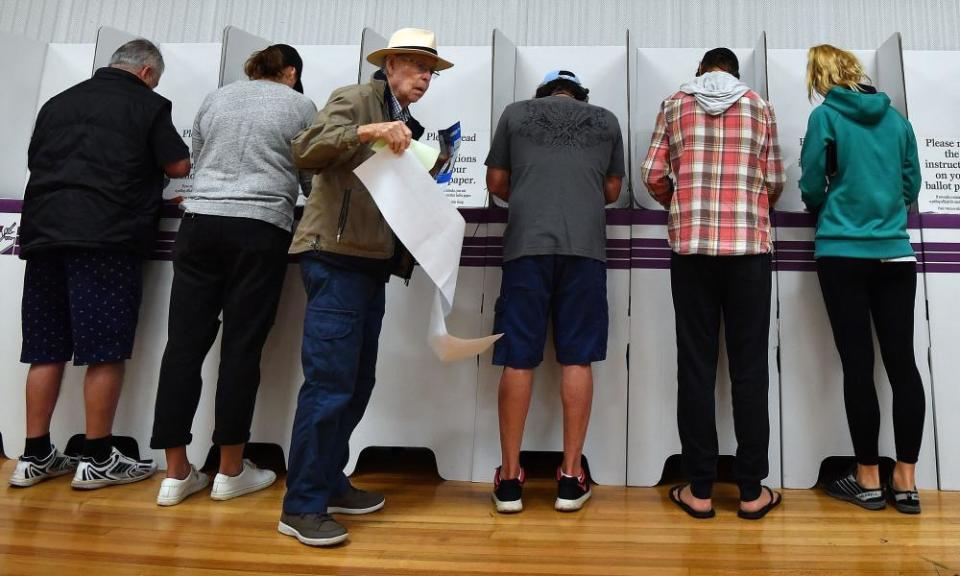Liberal party says rival New Liberals will cause ‘widespread voter confusion’

The Liberal party has warned of “widespread voter confusion” that would likely distort election results if a rival party, the New Liberals, is allowed to register and run candidates with that name.
In an objection to the Australian Electoral Commission, the Liberal party has accused the New Liberals of a “cynical attempt to piggyback” on its brand and tabled Crosby Textor research claiming up to two-thirds of voters wrongly believed the parties were connected.
The New Liberals was founded in 2019 by the Sydney barrister Victor Kline, who is also a founder and director of the Refugee Law Project. He is also the party’s leader.
Related: Liberal plan to change federal voting laws may have crossbench support
The New Liberals say they are “economically responsible” and “socially progressive” and target the Liberals over failures on climate change and treatment of refugees.
Claiming the mantle of liberalism and providing inner-city voters with a non-Labor alternative to the Liberals has helped independents including Zali Steggall win previously blue-ribbon seats, efforts set to continue at the next election.
Kline told Guardian Australia the New Liberals aim to run candidates for the Senate in every state and up to three dozen urban seats held by Liberal MPs, preferencing independents such as the Voice movement first and the Liberals last.
The Liberal party argued in its submission that the New Liberals brand should be rejected because it “so nearly resembles” its name it “is likely to be confused with or mistaken for” it, and that a “reasonable person would think [the name] suggests a connection or relationship” – two grounds for refusal in the Electoral Act.
The Liberal party argued that registration would “imperil the integrity of any election in which the New Liberals endorsed a candidate” because the use of the word “new” suggests the party is a rebranding or division of the Liberal party.
In response, Kline said the Liberal party brand “is a massive deception in itself” as the Liberals have “perverted a well-known political term to mean the opposite, to describe an ultra-conservative party”.
“Look at the definition of new – it means different,” he said. “Nobody is going to think Coke and New Coke are the same thing.”
Kline predicted the New Liberals would win its registration fight because federal court case precedent showed “you can’t lock up a term of generic use, and you can’t make that your property”.
A survey of 2,036 voters conducted by Michael Turner, the head of research at the CT Group (Crosby Textor), found that when the New Liberals were included as an option, they garnered votes “at the expense of the Liberal party vote only”, the Liberals submitted.
The survey found that 66% of respondents thought there was some form of connection between the parties, consisting of 23% who thought it was a rebrand, 30% who said it was a separate party but with a connection or relationship, 5% who suggested it was localised branding of the Liberal party, and 8% who thought it was a separate division.
Just 16% of those surveyed said the New Liberals was a new party that was “entirely separate” from the Liberals and 18% were unsure.
Related: AEC to investigate Liberal MP Andrew Laming over network of Facebook pages that promote LNP
Asked if the New Liberals and the Liberal Party of Australia were the same party, 40% said they were different parties, 29% said the same and 31% were unsure.
The survey found that when the New Liberals appeared on the bottom of the ballot paper it received 0.4% of the vote, but could win 7% if placed at the top.
Kline rejected the survey’s findings, arguing that using a process where respondents opt in means only “people with a particular interest” in a subject will participate, which is not a fair reflection of the electorate given voting is compulsory.
The Liberal party submitted registration of the New Liberals “will almost certainly lead to widespread voter confusion and will in all likelihood result in election outcomes for both House of Representatives and the Senate which are contrary to voter intention”.
It cited the Liberal Democrats’ success in Senate elections at its expense, including the 2013 election at which David Leyonhjelm recorded a 7.19% swing towards him and polled 9.3% as a result of being 20 positions to the left of the Liberals on ballot papers. Leyonhjelm was elected as a result.
The Liberal party also claimed the Liberals for Forests helped John Howard lose the marginal seats of Parramatta and Richmond in the 2004 election.
In the survey, those who said they would vote for the New Liberals were then told the party is led by Kline and had no relationship to the Liberals. Asked who they had intended to vote for, 88% said they had intended to vote for the Liberal or Liberal National parties and only 5% intended to vote for the New Liberals.
The Liberal party noted that at the 2019 election 13 seats were decided by less than 2%, and 2016 was “even closer” with 19 decided by less than that margin.
The impact of registering the New Liberals “will be widespread and will have a devastating effect on the integrity of the voting system”, it said.
“It does not take many voters being confused, mistaken or uncertain about the party they are casting a vote for, for the impact to be substantial.”
The Liberals’ objection is supported by its Coalition partner, the Nationals.

 Yahoo Finance
Yahoo Finance 